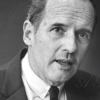Carroll Quigley

Carroll Quigley
Carroll Quigleywas an American historian and theorist of the evolution of civilizations. He is noted for his teaching work as a professor at Georgetown University, for his academic publications, and for his research on the Round Table movement...
NationalityAmerican
ProfessionWriter
Date of Birth9 November 1910
CountryUnited States of America
party political would-be
When the business interests... pushed through the first installment of civil service reform in 1883, they expected that they would be able to control both political parties equally.
party two profound
Instead, the two parties should be almost identical, so that the American people can ‘throw the rascals out’ at any election without leading to any profound or extensive shifts in policy.
party years ideas
The argument that the two parties should represent opposed ideals and policies, one, perhaps, of the Right and the other of the Left, is a foolish idea acceptable only to doctrinaire and academic thinkers. Instead, the two parties should be almost identical, so that the American people can throw the rascals out at any election without leading to any profound or extensive shifts in policy. Then it should be possible to replace it, every four years if necessary, by the other party, which will be none of these things but will still pursue, with new vigor, approximately the same basic policies.
bankers business faster increased loans money result volume
The bankers made loans to business so that the volume of money increased faster than the increase in goods. The result was inflation.
against anyone common germany might occurred position russia
It never occurred to anyone in a responsible position that Germany and Russia might make common cause, even temporarily, against the West.
control countries country money recent single subject supply
The supply of money in a single country was subject to no centralized, responsible control in most countries over recent centuries.
ability decisions influence opinion
More important than the Milner Group's ability to influence opinion in the Dominions was its ability to influence decisions in London.
civilization firsts complicated
A civilization is complicated, in the first place, because it is dynamic; that is, it is constantly changing in the passage of time, until it has perished.
leaving might empires
It is also in theory, conceivable that some universal empire some day might cover the whole globe, leaving no external "barbarians" to serve as invaders.
outsiders groups members
A society is a group whose members have more relationships with one another then they do with outsiders.
organization political separation
Our political organization, based as it is on an eighteenth-century separation of powers and on a nineteenth-century nationalist state, is generally recognized to be semiobselete.
religious political intellectual
The backwardness of our religious and social developments is undoubtedly holding back the development of the intellectual and political levels.
actors process irrational
When we approach history, we are dealing with a conglomeration of irrational continua. Those who deal with history by nonrational processes are the ones who make history, the actors in it.
being-free groups behavior
The social sciences are usually concerned with groups of persons rather than individual persons. The behavior of individuals, being free, is unpredictable.